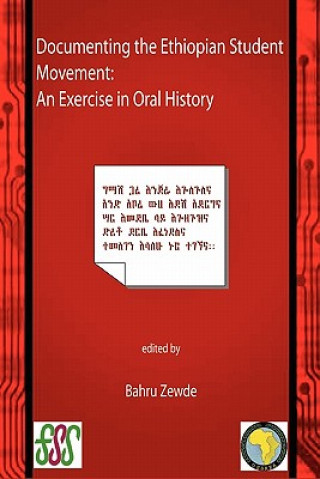
Kód: 09019823
Documenting the Ethiopian Student Movement
Autor Bahru Zewde
The place of intellectuals (in the broad sense of the educated elite) in society has varied in place and time. The higher the level of industrial development, the less influence they seem to exercise. Thus, while intellectuals may ... celý popis
- Jazyk:
 Angličtina
Angličtina - Vazba: Brožovaná
- Počet stran: 164
Nakladatelství: Forum for Social Studies (FSS), 2010
- Více informací o knize

Mohlo by se vám také líbit
-

Water Transport
1032 Kč -

Intellectuals and Cultural Policy
1085 Kč -

Behind Her Eyes
290 Kč -

Le Corbusier Guide
707 Kč -

Super Juice Me!
329 Kč -

Annual Report
1313 Kč -

Performance Of Select Disinvested Public Sector Enterprises In India
2675 Kč -

CHRISTMAS SOLOIST THE MEDHIGH
450 Kč -

Zen of Tantra. Tibetan Great Perfection in Fahai Lama's Chinese Zen Monastery
742 Kč -

Digital Public Domain
871 Kč -

Wise Shall Inherit Glory
608 Kč -

Research in Law Enforcement Selection
595 Kč -

Gesundheitsfalle Studium schnappt zu
1180 Kč -

Die letzten Tage von Atlantis
594 Kč
Dárkový poukaz: Radost zaručena
- Darujte poukaz v libovolné hodnotě a my se postaráme o zbytek.
- Poukaz se vztahuje na celou naši nabídku.
- Elektronický poukaz vytisknete z e-mailu a můžete ihned darovat.
- Platnost poukazu je 12 měsíců od data vystavení.
Více informací o knize Documenting the Ethiopian Student Movement
Nákupem získáte 126 bodů
 Anotace knihy
Anotace knihy
The place of intellectuals (in the broad sense of the educated elite) in society has varied in place and time. The higher the level of industrial development, the less influence they seem to exercise. Thus, while intellectuals may be sought as advisors and members of think tanks in the so-called First World, they are rarely seen exercising direct state power. The situation is different in the so called Third World, notably Africa. The educated elite has historically seemed destined - by social ascription or self-arrogation - to play a central role in the exercise of state power. In Africa alone, the first generation of post-independence rulers - Kwame Nkrumah of Ghana, Léopold Sedar Senghor of Senegal, Julius Nyerere of Tanzania - provides us with ample evidence to appreciate this reality. In Ethiopia, too, intellectuals have played a role and exercised an influence disproportionate to their size. This can be divided broadly into two phases, with the Italian Occupation (1936-1941) forming an important watershed between them.The pre-war intellectuals were preoccupied with a whole gamut of concerns ranging from educational development to fiscal reform. They had an essentially reformist agenda.The Fascist Italian invasion and the subsequent occupation not only terminated their careers but also - through its merciless policy of liquidation of the educated elite - created a gap in intellectual activity in the immediate post - Liberation years. The second period of intellectual intervention could thus begin only in the late 1950s. It revolved mainly around Ethiopian students (mostly at the tertiary level at the initial stage), both at home and abroad. This eventually evolved into what came to be known as the Ethiopian Student Movement. The movement could be said to have gone through three successive stages: self-awareness, reformism, revolutionary commitment. There is general agreement that the year 1965, when students came out onto the streets with the slogan of "Land to the Tiller", marked the beginning of the third stage. It is this third stage that is the focal point of this study. For it constitutes the crucial period that forms both the backdrop and the essence of the changes that have come to affect fundamentally the Ethiopian state and society - changes that are yet far from over.
 Parametry knihy
Parametry knihy
Zařazení knihy Knihy v angličtině Humanities History Regional & national history
1264 Kč
- Plný název: Documenting the Ethiopian Student Movement
- Podnázev: An Exercise in Oral History
- Autor: Bahru Zewde
- Jazyk:
 Angličtina
Angličtina - Vazba: Brožovaná
- Počet stran: 164
- EAN: 9789994450336
- ISBN: 9789994450336
- ID: 09019823
- Nakladatelství: Forum for Social Studies (FSS)
- Hmotnost: 260 g
- Rozměry: 228 × 154 × 11 mm
- Datum vydání: 26. August 2010
Oblíbené z jiného soudku
-

Hundred Years' War on Palestine
356 Kč -

Ethnic Cleansing of Palestine
378 Kč -

History of Japan
403 Kč -

Ten Myths About Israel
341 Kč -

Strange Death of Europe
433 Kč -

Decline and Fall of the Roman Empire
139 Kč -

Secret History
342 Kč -

God's Playground A History of Poland
1699 Kč -

Mayflower
401 Kč -

How to be a Victorian
302 Kč -

Plantagenets
356 Kč -

General's Son
424 Kč -

Iran: A Very Short Introduction
282 Kč -

Temples of Karnak
3798 Kč -

Twenty Years A-Growing
249 Kč -

Cuneiform
276 Kč -

History of Witchcraft in England from 1558 to 1718
432 Kč -

China in Africa
906 Kč -

Bohemian Paris
415 Kč -

Islandman
282 Kč -

Lancaster And York
493 Kč -

Alexiad
440 Kč -

Inside Hitler's Greece
517 Kč -

Modern France: A Very Short Introduction
336 Kč -

Diana: Her True Story - In Her Own Words
323 Kč -

The Fourth Turning
476 Kč -

The Oxford History of Ancient Egypt
383 Kč -

Churchill: The Power of Words
384 Kč -

Palestine
574 Kč -

Korean History in Maps
706 Kč -

Great Gatsby (Wisehouse Classics Edition)
406 Kč -

Viking Way
1267 Kč -

The Thirteenth Tribe
309 Kč -

My Promised Land
378 Kč -

Vanished Kingdoms
542 Kč -

Age Of Revolution
410 Kč -

Life and Death of Anne Boleyn
584 Kč -

Coming of the Third Reich
463 Kč -

Children of Ash and Elm
487 Kč -

Europe Between the Oceans
799 Kč -

Socialism Betrayed
478 Kč -

303 Squadron
463 Kč -

Ancient Celts, Second Edition
655 Kč -

Dancing in the Glory of Monsters
400 Kč -

Battle of Britain: Luftwaffe Blitz (Images of War)
655 Kč -

Age of Confucian Rule
851 Kč -

Beyond Band of Brothers
410 Kč -

Benjamin Franklin
410 Kč -

On China
487 Kč
Osobní odběr Praha, Brno a 12903 dalších
Copyright ©2008-24 nejlevnejsi-knihy.cz Všechna práva vyhrazenaSoukromíCookies



 Vrácení do měsíce
Vrácení do měsíce 571 999 099 (8-15.30h)
571 999 099 (8-15.30h)